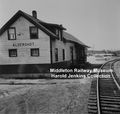Dominion Atlantic Railway Digital Preservation Initiative - Wiki
Use of this site is subject to our Terms & Conditions.
Difference between revisions of "Aldershot Station"
Dan Conlin (talk | contribs) (no gothic window) |
Dan Conlin (talk | contribs) (variation) |
||
| Line 3: | Line 3: | ||
==History== | ==History== | ||
| − | The Aldershot station served both the military based and the adjacent civilian community. It was first built with [[:Category:Stations#W&AR Second Generation Wood Stations ~1880-1900|Windsor & Annapolis Second Generation station design]]. Unlike most of the W&AR designs of this period, it had a rectangular instead of a gothic window in the passenger waiting room. A two-story section house was later added to the south end of the station. A portion of the station was salvaged and moved to [[Mill Village]] after the station was demolished in the 1960s. A second station building was used by the army for troops and telegraph use on the Aldershot wye. It survives in use after the end of the railway and as of 2008 was being used by the Aldershot military band. | + | The Aldershot station served both the military based and the adjacent civilian community. It was first built with [[:Category:Stations#W&AR Second Generation Wood Stations ~1880-1900|Windsor & Annapolis Second Generation station design]]. Unlike most of the W&AR designs of this period, it had a rectangular instead of a gothic window in the passenger waiting room, a similar variation found in the [[Kingston Station]]. A two-story section house was later added to the south end of the station in later years. A portion of the station was salvaged and moved to [[Mill Village]] after the station was demolished in the 1960s. A second station building was used by the army for troops and telegraph use on the Aldershot wye. It survives in use after the end of the railway and as of 2008 was being used by the Aldershot military band. |
==Gallery== | ==Gallery== | ||
Latest revision as of 16:19, 6 February 2025
Aldershot Station
Mile 1.6 on the Kingsport Subvision
History
The Aldershot station served both the military based and the adjacent civilian community. It was first built with Windsor & Annapolis Second Generation station design. Unlike most of the W&AR designs of this period, it had a rectangular instead of a gothic window in the passenger waiting room, a similar variation found in the Kingston Station. A two-story section house was later added to the south end of the station in later years. A portion of the station was salvaged and moved to Mill Village after the station was demolished in the 1960s. A second station building was used by the army for troops and telegraph use on the Aldershot wye. It survives in use after the end of the railway and as of 2008 was being used by the Aldershot military band.
Gallery
Aldershot Station postcard with troop train from the Aldershot base, circa 1912.
Aldershot Station, from the north, circa 1916.
Aldershot Station, from the south, dated August 1943.
References and Footnotes



